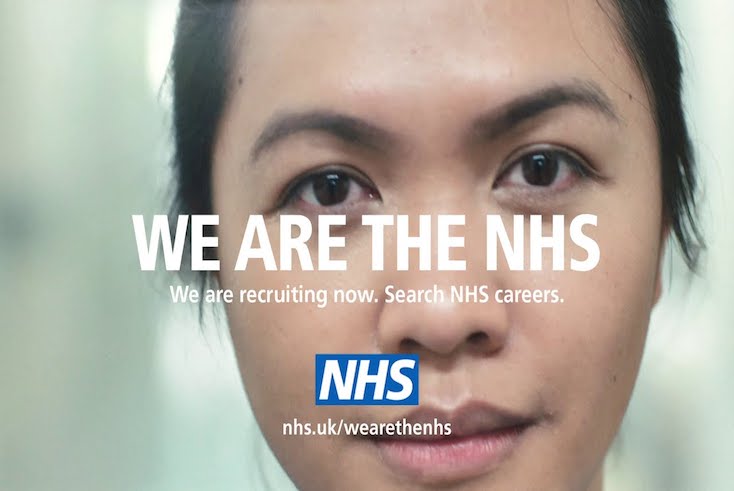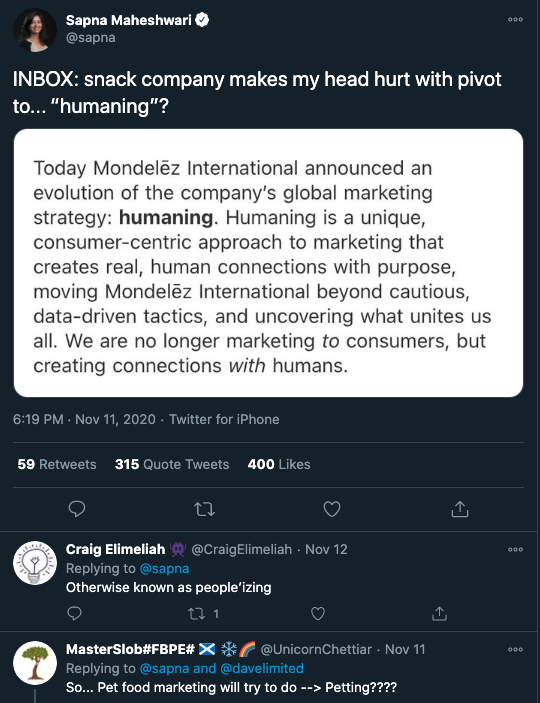‘Humaning’, the NHS goes epic, and name calling

Dominic Mills reneges on reviewing a new batch of Christmas ads to heap praise and scorn on two very different organisations
Sorry readers, but this week I’m taking a break from Christmas ads. Last week I said I’d review some more Christmas ads — it was a statement of intent and not, as I see it, a binding promise — so I’m reneging on it.
So TK Maxx’s goat and others, not least the JLP/Waitrose effort and those from the big guns of the supermarket world — will have to wait.
Why? Well, I’m a bit tired of Christmas ads already and there’s more fun and interest to be had with this week’s subjects.
Algorithmic gobbledegook jargon
I bring you a marketing revolution from the world of not-very-good-for-you snacks: Mondelez has discovered that its products are purchased by organisms we call people or, as it — sort of — likes to describe them, humans.
Yes, as of last week, Mondelez has a new marketing mantra: Humaning.
No, I’m not making it up and yes, I know it’s a made-up word (Oi, Mondelezians, ‘human’ is a noun or an adjective, not a verb). You can read it here. Seeing as Mondelez has decided to put the news on the corporate website it must see it as a big deal.
Anyway, ‘humaning’ is apparently (its words) ‘a unique, consumer-centric approach to marketing that creates real, human connections with purpose moving Mondelēz International beyond cautious, data-driven tactics, and uncovering what unites us all. We are no longer marketing to consumers, but creating connections with humans’ blah blah blah bollocks etc.
The Twitter sphere is rightly contemptuous too.

It’s hard to know where to start unpacking this, but the idea that it is ‘unique’ is certainly odd. Unique to whom? Certainly not to 95% of other marketers who I think, even if they don’t always succeed, recognise that they have a human consumer in mind.
And nor, it must be said, is the idea entirely absent from some of Mondelez’s own marketing: Cadbury’s Dairy Milk has been doing this for years — mostly pretty well.
Look closer however, and you will see that global marketing boss Martin Renaud — owner of ‘humaning’ — is trying to shake Mondelez marketers out of what he sees as “cautious, data-driven tactics”.
Good luck with that one, Martin. Can you think of any inspiring ads from these brands?
It’s a pity however, that the word ‘humaning’, as with others in the new Mondelez mantra like “purpose’, ‘connections’, ‘right snack, right moment’ and so on appears to have been put together by an algorithm, based on using en-vogue marketing jargon.
And now let’s move from the ridiculous to….
An NHS epic
When the history of Covid-19 is written, there will be many unsung individual heroes. But very few organisations will qualify as heroic.
One that absolutely will is the NHS, whose jewel-in-the-crown status is significantly enhanced every day.
Not that we need it, but the latest MullenLowe ad — the full version being a two-minute special that grips from start to finish — reminds us of the way it is central to our lives.
There is only one word to describe it, and that is epic.
In terms of epic-ness (yeah Mondelez, I can make up words too), it’s as epic as anything we’ll see this Christmas season.
It’s an intangible thing, but as I started watching, it seemed to me to capture the very spirit of the NHS as originally set out at launch in 1948 in a leaflet sent to every household to explain what was then, and in many ways remains so today, an utterly revolutionary idea.

The leaflet opens by asking:
‘Your new National Health Service begins on 5th July. What is it? How do you get it?’
And then explains it in simple, universal and unambiguous language:
‘It will provide you with all medical, dental and nursing care. Everyone — rich or poor, man, woman or child — can use to or any part of it. There are no charges, except for a few special items. There are no insurance qualifications. But it is not a “charity”. You are all paying for it, mainly as tax payers, and it will relieve your money worries in times of illness.”
And of course, none of that has changed.
Without overdoing it, the ad tips a discreet hat to this founding statement: at 25 seconds in, a nurse holds up a copy of the original leaflet. The voiceover says: “We’re an institution built on a constitution.”
But, it goes without saying, the NHS is under huge pressure, so this isn’t a ‘let’s-just-splurge-some-money-to-tell-everyone-how-fab-we-are’ act of self-gratification.
Of all the issues the NHS faces, perhaps the most fundamental is the shortage of staff. So this is a big, busting, recruitment ad — possibly the biggest recruitment ad most of us will have seen outside of wartime.
So we all better pray it works. But since MullenLowe has good form in this area, chances are it will. Its previous 2018 effort ‘We are the NHS’ reversed a long-running recruitment and retention problem and picked up a bronze at the 2020 IPA Effectiveness awards. You can read a detailed case study here.
What with Downing Street aides throwing teenage tantrums and a government suffering from delusions of competence, we don’t have much to be proud of currently in the UK except, as this ad reminds us, the NHS.
And by the way, it doesn’t even mention the C word. Quite a relief.
Name calling
First reports last week seemed to suggest that, following the merger between Grey and AKQA, the name Grey would disappear.
Now it seems it won’t, or at least not immediately.
This makes sense. Grey has 100+ years of history, AKQA less than 30. For many of the combined group’s potential clients, the AKQA name wouldn’t mean anything. And while some would be turned on by the digital whizziness of AKQA, others might prefer the comfort of something longer established.
It also follows the naming convention — seemingly successful — established by WPP in merging Wunderman and Thompson, and VML and Y&R.
Some will say this reeks of compromise and the need to protect egos, as well as the desire to be all things to all people. But there’s nothing wrong with either — for now at any rate.
Putting two organisations together is all about compromise, and if you neglect ego it could all get ugly; at the same time the combined entity will want to appeal to as many clients or satisfy as many needs as it can.
Nevertheless, while important the name issue is largely symbolic. In the end, what matters is whether the combined entity will reflect the best of both groups with a sufficiently differentiated offering, or the worst and an offering that stands for nothing, which is how many mergers end-up.
One thing it does tell us about the business generally is that there are still too many agencies, especially amongst the holding companies. Expect more mergers of this type.



